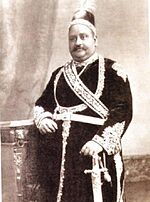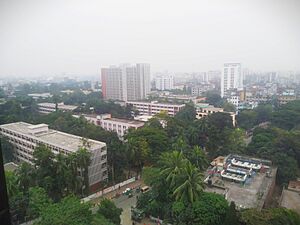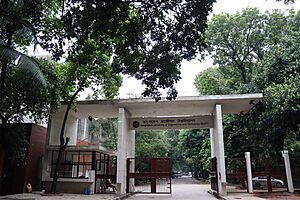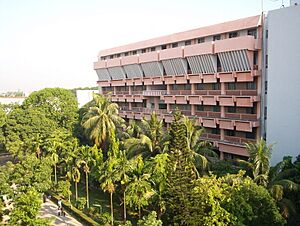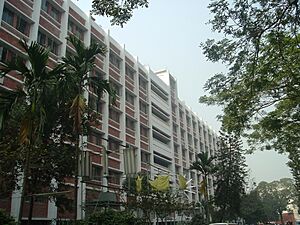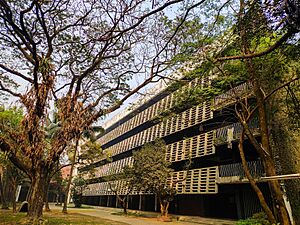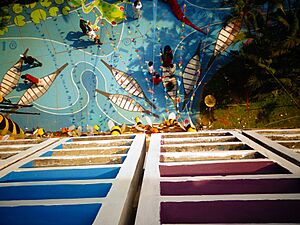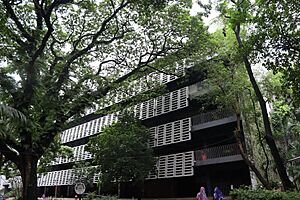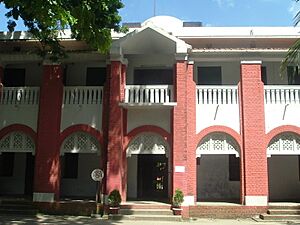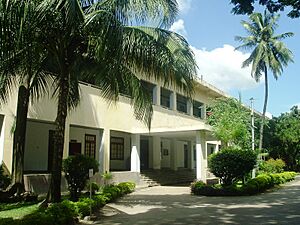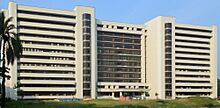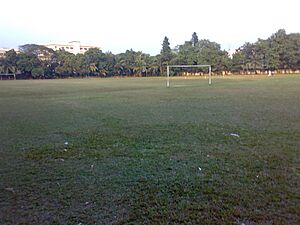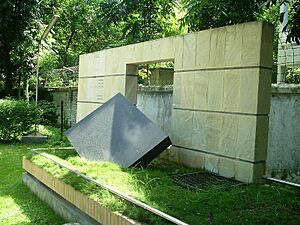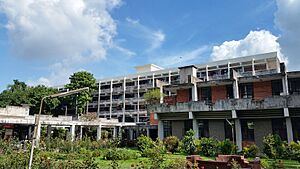Bangladesh University of Engineering and Technology facts for kids
|
বাংলাদেশ প্রকৌশল বিশ্ববিদ্যালয়
|
|
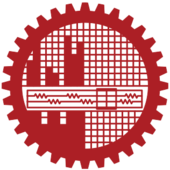 |
|
|
Other name
|
BUET |
|---|---|
|
Former name
|
List
Dacca Survey School (1876–1908)
Ahsanullah School of Engineering (1908–1947) Ahsanullah Engineering College, University of Dacca (1947–1962) East Pakistan University of Engineering and Technology (EPUET) (1962–1971) |
| Type | Public, Research |
| Established | 1876 as School 1948 as college 1962 as University |
| Accreditation |
|
| Affiliation | University Grants Commission (UGC) |
| Endowment | ৳1.024 billion (2015–16) ($13 million) |
| Budget | ৳229.30 crore (US$24 million) (2024–2025) |
| Chancellor | President Mohammed Shahabuddin |
| Vice-Chancellor | Professor Dr. Abu Borhan Mohammad Badruzzaman |
|
Academic staff
|
579 (February 2020) |
|
Administrative staff
|
1,338 (February 2020) |
| Students | 9,234 (February 2020) |
| Undergraduates | 5,636 (February 2020) |
| Postgraduates | 3,598 (February 2020) |
| Location |
,
1000
,
Bangladesh
23°43′36″N 90°23′33″E / 23.72667°N 90.39250°E |
| Campus | Urban, 91.37 acres (36.98 ha) |
| Language | English |
| Colors | Red |
| University rankings | |
|---|---|
| Global – Overall | |
| QS World | 761–770 (2025) |
| THE World | 1001–1200 (2025) |
| Global – Science and engineering | |
| THE Computer Science | 601-800 (2025) |
| THE Engineering | 601-800 (2025) |
| THE Physical Sciences | 601-800 (2025) |
| Regional – Overall | |
| QS Asia | 158 (2025) |
| THE Asia | 301-350 (2025) |
The Bangladesh University of Engineering and Technology (which is বাংলাদেশ প্রকৌশল বিশ্ববিদ্যালয় in Bengali), often called BUET, is a top public university in Dhaka, the capital city of Bangladesh. It focuses on technology and research. BUET started in 1876 as the Dacca Survey School and became a university in 1962. It is the oldest place in Bangladesh for studying engineering, architecture, and city planning.
BUET is known as one of the best universities in Bangladesh for science and research, especially in engineering. Many people who studied at BUET have gone on to do important work in engineering and other fields, both in Bangladesh and around the world.
Contents
History of BUET
The Dacca Survey School began in 1876 in Old Dhaka. It was started by the government of Bengal under British rule. The school taught two-year courses to train land surveyors.
By 1903, the school had 117 students. In 1908, it started offering diploma degrees. Nawab Sir Khwaja Ahsanullah, a kind person from Dhaka, gave money to help the school grow. After he passed away in 1901, his son, Sir Khwaja Salimullah, made sure the money was given in 1902. To thank them for this help, the school was renamed Ahsanullah School of Engineering in 1908.
In 1908, the school offered three-year diploma courses in civil, electrical, and mechanical engineering. In 1912, the university moved to its current location.
After India was divided in 1947, the school was upgraded to Ahsanullah Engineering College. It became part of the University of Dhaka. It started offering four-year bachelor's degrees in civil, electrical, mechanical, chemical, and metallurgical engineering.
In 1962, the college was upgraded again to become the East Pakistan University of Engineering and Technology (EPUET). This was done to allow for more advanced studies and research. EPUET became the fourth university in what was then East Pakistan. During this time, professors from Texas A&M University in the US came to help teach and create the study plans.
After Bangladesh became independent in 1971, EPUET was renamed the Bangladesh University of Engineering and Technology (BUET).
In 2002, a student named Sabekun Nahar Sony was sadly killed during a conflict between student groups at BUET.
In October 2019, a student named Abrar Fahad was tortured and beaten to death in a student hall by members of a student group. This group was later banned in 2024. Reports showed that violence and bullying by this group were common in the dorms. Abrar Fahad's death led to nearly two months of student protests against violence and bullying in the residence halls. The protests stopped after the university agreed to the students' requests. They expelled many students involved in the killing and put new rules in place against bullying and political activities.
In February 2021, BUET and the technology company Huawei agreed to create the first Information and Communications Technology (ICT) Academy in Bangladesh at the BUET campus. In June 2021, BUET and Saitama University, Japan, renewed their agreement for student and academic exchange, continuing a relationship that has lasted for 20 years.
In January 2022, BUET was ranked as the 1st university in Bangladesh and 1589th globally by the Webometrics Ranking of World Universities.
What BUET Offers
Campus Life
BUET has a campus in the Palashi area of Dhaka. It has buildings for classes and offices, student dorms, and other useful facilities.
Departments and Study Areas
BUET has 18 departments organized into six main study areas called faculties. Thirteen departments offer courses for undergraduate students (those working on their first degree). All of these, except for the humanities department, also offer courses for postgraduate students (those working on master's or PhD degrees).
- Chemical and Materials Engineering:
- Chemical Engineering (ChE)
- Materials and Metallurgical Engineering (MME)
- Nanomaterials and Ceramic Engineering (NCE)
- Petroleum and Mineral Resources Engineering (PMRE)
- Civil Engineering:
- Civil Engineering (CE)
- Water Resources Engineering (WRE)
- Electrical and Electronic Engineering:
- Electrical and Electronic Engineering (EEE)
- Computer Science and Engineering (CSE)
- Biomedical Engineering (BME)
- Science:
- Chemistry (Chem)
- Mathematics (Math)
- Physics (Phys)
- Mechanical Engineering:
- Mechanical Engineering (ME)
- Industrial and Production Engineering (IPE)
- Naval Architecture and Marine Engineering (NAME)
- Architecture and Planning:
- Architecture (Arch)
- Urban and Regional Planning (URP)
- Humanities (Hum)
Special Institutes
BUET has eight special institutes. These institutes offer advanced diplomas, master's, and doctoral degrees.
- Institute of Water and Flood Management (IWFM)
- Institute of Appropriate Technology (IAT)
- Institute of Information and Communication Technology (IICT)
- Accident Research Institute (ARI)
- BUET-Japan Institute of Disaster Prevention and Urban Safety (BUET-JIDPUS)
- Institute of Nuclear Power Engineering (INPE)
- Institute Of Robotics And Automation (IRAB)
- Institute of Energy and Sustainable Development (IESD)
Research Centers
BUET has several centers where important research is done.
- Centre for Energy Studies (CES)
- Centre for Environmental and Resource Management (CERM)
- Biomedical Engineering Centre (BEC)
- Bureau of Research, Testing & Consultation (BRTC)
- International Training Network Centre (ITN)
- Bangladesh Network Office for Urban Safety (BNUS)
University Rankings
BUET is highly ranked among universities. In 2024, it was ranked among the top 801–850 universities in the world by QS World University Rankings. It was also ranked 187th in Asia and 2nd in Bangladesh.
University Library
The main library at BUET has a huge collection of books and journals, with over 142,000 items. About 1,500 new books are added every year. The main reading room can hold 200 students at a time, providing a quiet place to study and read important books. Each department and student hall also has its own library.
In February 2025, the central library was renamed 'Shahid Abrar Fahad Library' to remember Abrar Fahad.
Graduation Ceremonies
After Bangladesh became independent and the university changed its name, the first graduation ceremony (called a convocation) was held in 1973. Since then, many more convocations have taken place, with the most recent one in 2019.
How BUET is Managed
The president of Bangladesh is the ceremonial head of the university, called the Chancellor. The Chancellor appoints the Vice-Chancellor, who is the main leader of the university. The Vice-Chancellor is always a senior professor from BUET. The university is managed by a group called the University Syndicate, led by the Vice-Chancellor.
The Syndicate includes leaders from different faculties, government education officials, and important academics. Each faculty is led by a Dean, and each department by a Head. These leaders are usually full professors. Institutes, research centers, and other offices are led by directors who are also full professors. Other important roles include the registrar, who handles records, and the controller of exams.
BUET also has other important groups that help make decisions, like the Academic Council, which sets rules for studies, and committees for planning and development.
Leaders of BUET
Here is a list of the Vice-Chancellors who have led BUET:
- M. A. Rashid (1962 – 1970)
- Mohammed Abu Naser (1970 – 1975)
- Wahiduddin Ahmed (1975 – 1983)
- Abdul Matin Patwari (1983 – 1987)
- Musharrof Husain Khan (1987 – 1991)
- Muhammad Shahjahan (1991 – 1996)
- Iqbal Mahmud (1996 – 1998)
- Nooruddin Ahmed (1998 – 2002)
- Md. Alee Murtuza (2002 – 2006)
- A. M. M. Safiullah (2006 – 2010)
- S M Nazrul Islam (2010 – 2014)
- Khaleda Ekram (2014 – 2016)
- Saiful Islam (2016 – 2020)
- Satya Prasad Majumder (2020 – 2024)
- A. B. M. Badruzzaman (2024 – present)
How to Get Admitted
Undergraduate Admission
Getting into BUET for undergraduate studies is based on your grades and a very competitive written exam. Other things like extracurricular activities or financial needs are not considered.
To apply, students need to have good grades in mathematics, physics, and chemistry from their higher secondary level (HSC) exams. About 18,000 students with the best grades are allowed to take a first admission test.
After this test, about 1,309 students are chosen based on their scores and offered admission. The admission test is 400 marks, with 40 questions worth 10 marks each. There are 13 questions from physics, 13 from chemistry, and 14 from mathematics. The test lasts two hours.
There are also 26 spots for students from other countries. They need good grades in mathematics, physics, and chemistry from their high school exams. The admission fee is $200, and courses cost $50 per credit hour. Living costs are about $100 per month. A maximum of 10 students from any single country can be admitted.
| Department | Number of Students |
|---|---|
| Chemical Engineering | 120 |
| Materials & Metallurgical Engineering | 60 |
| Nanomaterials & Ceramic Engineering | 30 |
| Civil Engineering | 195 |
| Water Resources Engineering | 30 |
| Mechanical Engineering | 180 |
| Naval Architecture & Marine Engineering | 55 |
| Industrial & Production Engineering | 120 |
| Electrical & Electronic Engineering | 195 |
| Computer Science & Engineering | 180 |
| Biomedical Engineering | 50 |
| Architecture | 60 |
| Urban Planning & Regional Planning | 30 |
| Total | 1305 |
Postgraduate Admission
Around 1,000 students are accepted each year for master's and PhD programs. To get in, candidates usually need to do interviews or written tests.
BUET offers various postgraduate degrees, including Master of Science (MSc), Master of Science in Engineering (MSc Engg.), Master of Engineering (M. Engg), Master of Urban and Regional Planning (MURP), Master of Architecture (MArch), Master of Philosophy (M.Phil.), and Doctor of Philosophy (PhD). They also offer postgraduate diplomas in Information Technology (IT) and Water Resources Development.
Research and Innovation
BUET helps other organizations in Bangladesh by offering its expert knowledge, teachers, and lab facilities for advice and research. A special group called the Bureau of Research, Testing and Consultation (BRTC) manages these activities.
The university also works on research projects funded by international groups like the United Nations, Commonwealth Foundation, European Union, World Bank, and others.
During the COVID-19 pandemic, BUET created OxyJet, a low-cost breathing machine (CPAP ventilator). This invention was approved in July 2021 and helped many people.
Conferences and Workshops
BUET often hosts national and international meetings and workshops. These events help students and teachers improve their research skills. Some notable conferences include:
- International Conference on Information and Communication Technology
- International Conference on Mechanical Engineering (ICME)
- International Conference on Water and Flood Management (ICWFM)
- Bangladesh Civil Engineering Summit
- International Earthquake Symposium, Bangladesh
- International Conference on Disaster Risk Management (ICDRM)
- International Conference on Chemical Engineering (ICChE)
- International Conference on Climate Change Impacts and Adaption Strategies
- Bangladesh Geotechnical Conference
- International Conference on Electrical and Computer Engineering (ICECE)
- International Symposium and Workshop on Sustainable Transport for Developing Countries (STDC)
- International Conference on Marine Technology (MARTEC)
- International Workshop on Algorithms and Computation (WALCOM)
- International Conference on Networking Systems and Security (NSysS)
Student Life and Activities
Clubs and Organizations
All student political organizations and activities have been banned at BUET. This decision was made after the death of student Abrar Fahad. Teacher politics is also banned on campus.
Students at BUET can join many different clubs:
- Science and Technology Clubs:
- Satyen Bose Science Club
- BUET Nuclear Engineering Club
- BUET Automobile Club
- BUET Energy Club
- BUET Robotics Society
- BUET Cyber Security Club
- Team Interplanetar
- BUET Innovation and Designing Club
- Art and Cultural Clubs:
- BUET Drama Society
- BUET Film Society
- Murchona
- Origami Club
- Alokbortika-BUET
- BUET Sahitya Sangsad
- Charcoal- Artista Society
- Kontho-BUET
- Photography:
- BUET Photographic Society
- Environment:
- Environment Watch
- Sports:
- BUET Chess Club
- Helping Others:
- BADHAN-BUET zone
- BUET Rover Scout Group
- Career and Skills:
- BUET Career Club
- BUET Debating Club
- BUET Entrepreneurship Development Club
- Other Groups:
- BUET Brainiacs
- BUET Journalists Association
- BUET Self Defence Club
- House of Volunteers BUET- HoV BUET
Student Homes (Halls of Residence)
BUET has nine student dorms, called residence halls. Most are named after important people in Bangladesh's history:
- Ahsanullah Hall (named after Nawab of Dhaka, Nawab Bahadur Sir Khwaja Ahsanullah)
- Titumir Hall (named after Bengali Muslim revolutionary Syed Mir Nisar Ali Titumir)
- Sabekun Nahar Sony Hall (formerly Chattri Hall, named after Sabekun Nahar Sony, a student who died in 2002)
- Shadhinata Hall (previously: Bangamata Sheikh Fojilatunnesa Mujib Hall)
- Dr. M. A. Rashid Hall (named after M. A. Rashid, the first Vice-Chancellor of the university)
- Kazi Nazrul Islam Hall (named after the National Poet of Bangladesh Kazi Nazrul Islam)
- Sher-e-Bangla Hall (named after the 1st Prime Minister of Bengal- Sher-e-Bangla A. K. Fazlul Huq)
- Suhrawardy Hall (named after the Bengali leader and 5th Prime-minister of Pakistan Huseyn Shaheed Suhrawardy)
- Shahid Smrity Hall (named to remember those who died in the Bangladesh Liberation War)
Each hall has a leader called a provost, usually a senior teacher. Students who don't live in the halls can use the university's buses to travel around Dhaka city.
Sports Facilities
BUET has a large playground where students can play sports like cricket, football, and hockey. The university also holds its annual athletics competition there. Students can use the playground all year. Sometimes, professional football teams use it for practice. BUET also has a tennis court and a gym where students can exercise and play basketball.
Awards and Achievements
- Students from the Computer Science and Engineering (CSE) department at BUET have done very well in the ACM International Collegiate Programming Contest (ICPC). BUET was one of the first universities from Bangladesh and South Asia to join this important competition in 1998. Their best rank was 11th in the world.
| Year | Rank | Questions solved |
|---|---|---|
| 2021 | 24 (AWC) | 07 |
| 2019 | 62 | 04 |
| 2018 | 56 | 04 |
| 2017 | HM | – |
| 2016 | NQ | – |
| 2015 | NQ | – |
| 2014 | 19 | 03 |
| 2013 | 60 | 03 |
| 2012 | HM | – |
| 2011 | HM | – |
| 2010 | 36 | 04 |
| 2009 | 34 | 04 |
| 2008 | 31 | 04 |
| 2007 | HM | – |
| 2006 | 39 | 02 |
| 2005 | 29 | 04 |
| 2004 | NQ | – |
| 2003 | HM | – |
| 2002 | HM | – |
| 2001 | 29 | 03 |
| 2000 | 11 | 06 |
| 1999 | HM | – |
| 1998 | 24 | 03 |
*AWC = Asia-West Champion; HM = Unranked but Honourable Mention; NQ = Not Qualified
- Teams from BUET won first and third place globally in the 2014 IEEE Signal Processing Cup (SP Cup). They also won second and fifth place in 2015, and the Grand Prize (1st place) in 2016. In 2017, BUET teams won 1st and 3rd place in the IEEE Video and Image Processing Cup (VIP Cup) among over 200 teams worldwide.
- BUET teams won first place in the IEEE Myron Zucker Student Design Contest in Chicago, USA, in 2001.
- A BUET graduate was recognized by the American Society of Civil Engineers as one of the top 10 new faces in 2016 for their outstanding projects.
- BUET teams received the Panasonic Award at the Asia-Pacific Robot Contest ABU ROBOCON 2005 in Beijing.
- A BUET student won the 2006 IEEE Region 10 Student Paper Contest.
- BUET won the Student Enterprise Award in 2007 and the IEEE Vibrant Student Branch Award in 2008 from IEEE.
- BUET reached the "partial double octo-final" round (44th among 400 teams) at the 36th World Universities Debating Championship in 2016.
- A team from BUET became category champion in the NASA apps contest in 2020.
- BUET's Mars Rover Team won the Innovation Award in the International Planetary Aerial System Challenge (IPAS) 2021.
Notable People from BUET
See also
- List of dental schools in Bangladesh
- List of medical colleges in Bangladesh
- List of universities in Bangladesh
- University of Dhaka
- Khulna University of Engineering & Technology
- Dhaka University of Engineering & Technology
- Chittagong University of Engineering & Technology
- Rajshahi University of Engineering & Technology
 | Claudette Colvin |
 | Myrlie Evers-Williams |
 | Alberta Odell Jones |


